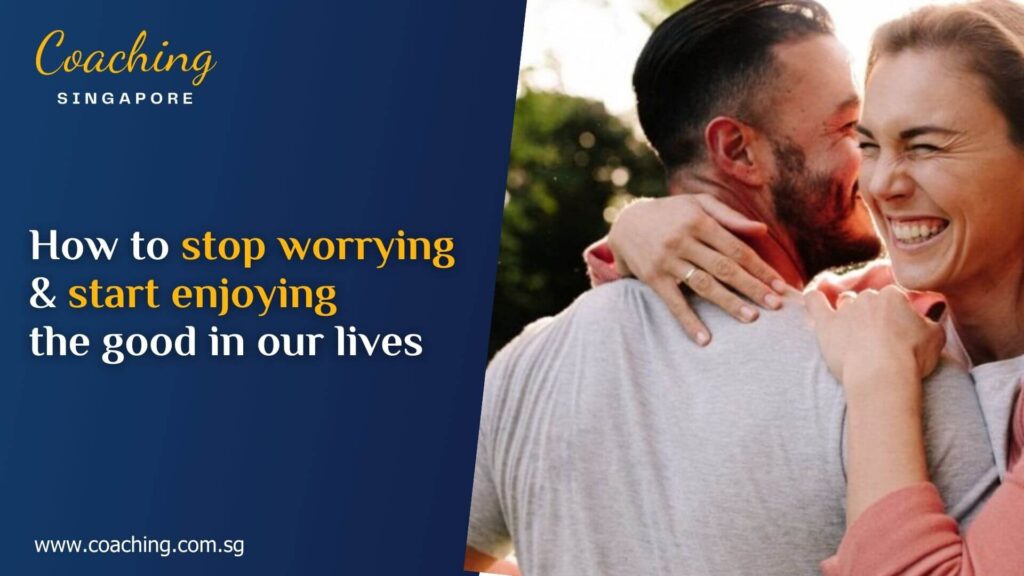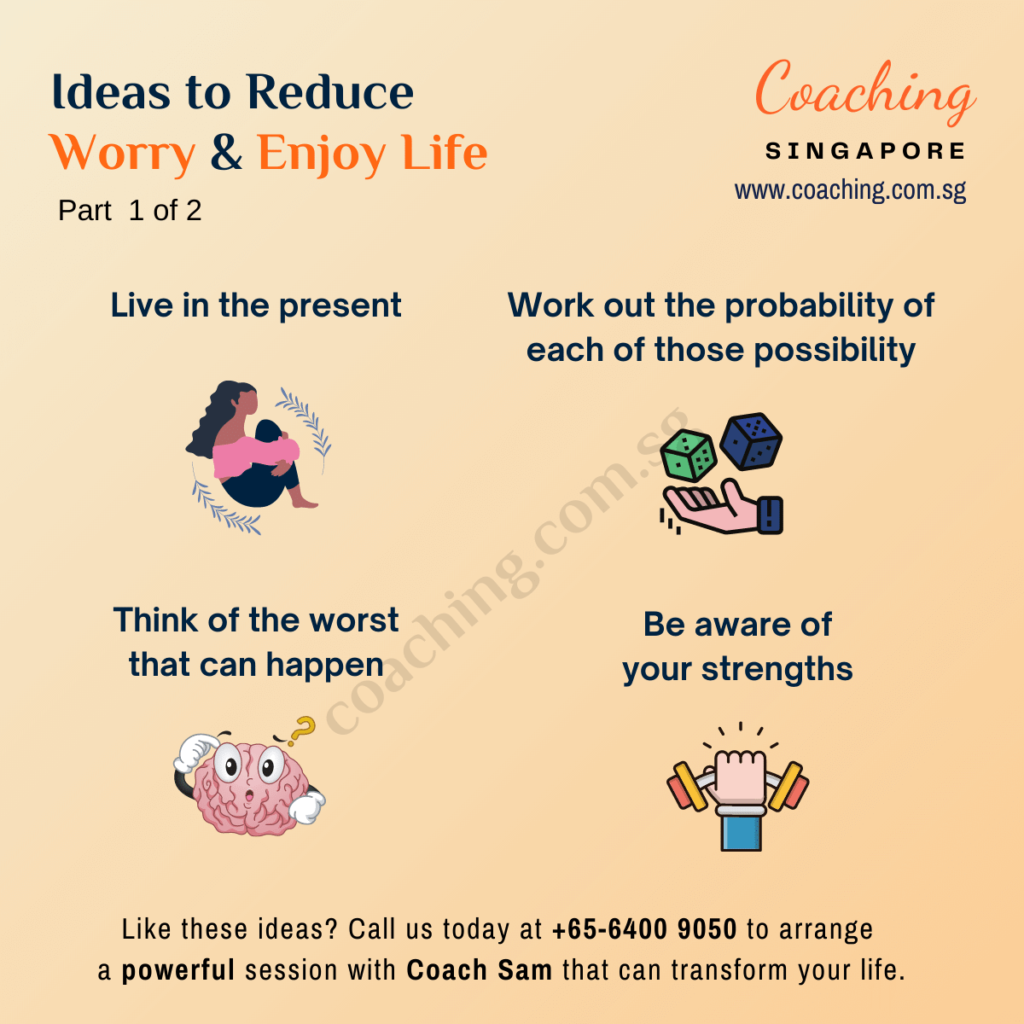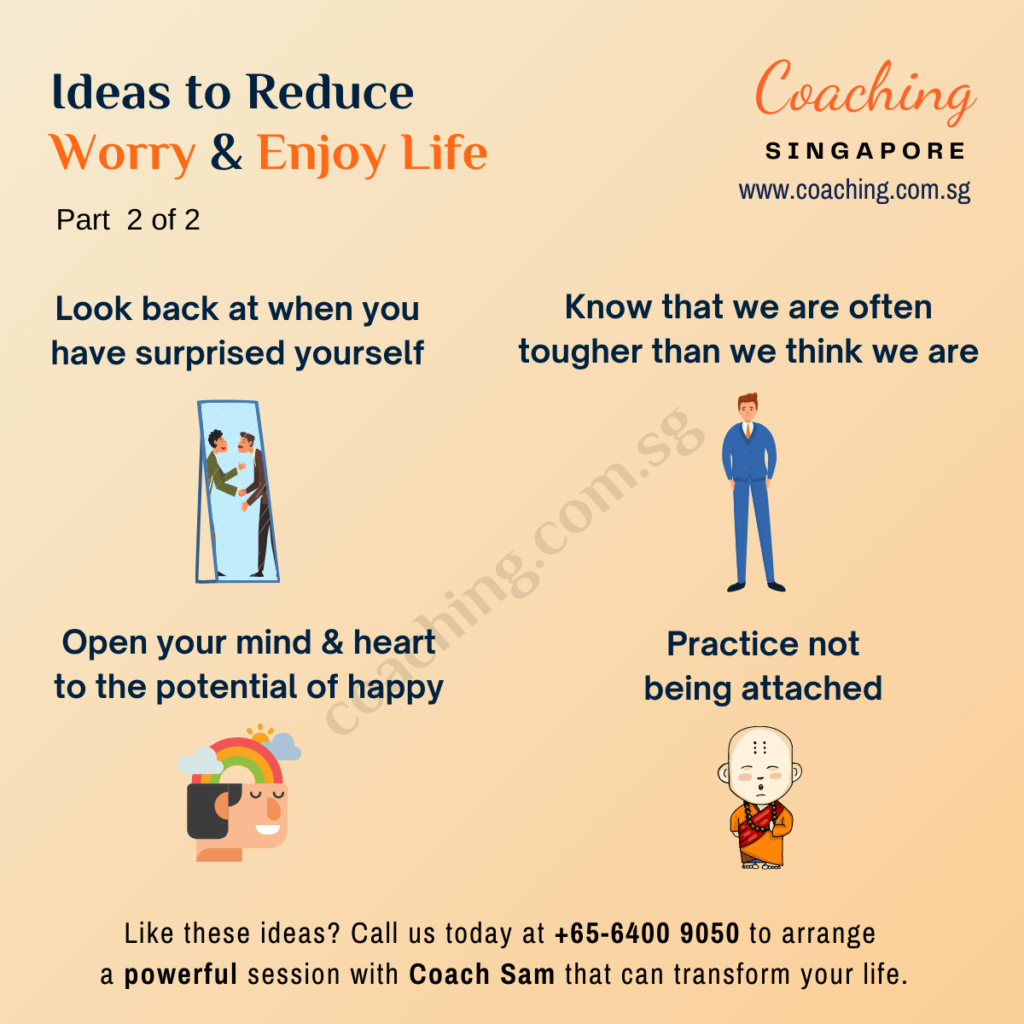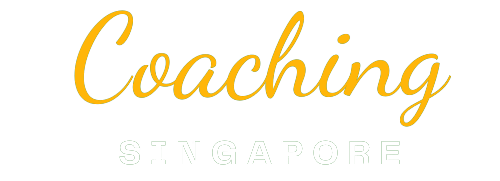Home » Emotional Resilience » How To Stop Worrying & Start Enjoying the Good in our Lives
How To Stop Worrying & Start Enjoying the Good in our Lives

- Author: Coach Sam
Worries, doubts, and anxieties are a normal part of life.
It’s natural to worry about an unpaid bill, an upcoming job interview, a first date, or situations much further out into the future.
But “normal” worry becomes excessive when it is persistent and uncontrollable.
You worry every day about “what-ifs” and worst-case scenarios.
You can’t seem to get anxious thoughts out of your head, and this interferes with your daily life.
Constant worrying, negative thinking, and always expecting the worst can take a toll on your emotional and physical health.
It can sap your emotional strength, leave you feeling restless and jumpy, cause insomnia, headaches, stomach problems, and muscle tension.
This makes it difficult to concentrate at work, school, or home.
You may take your negative feelings out on the people closest to you. You may self-medicate with alcohol or drugs, or try to distract yourself by zoning out in front of screens.
If you’re plagued by exaggerated worry and tension, there are steps you can take to turn off anxious thoughts.
Chronic worrying is a mental habit that can be broken.
You can train your brain to stay calm.
You can learn to look at life from a more balanced, less fearful perspective & that’s exactly what you are going to learn today!
Here is a breakdown of the ideas that we will be covering in this blog:
- Live in the present
- Think of the worst that can happen - the possibilities
- Work out the probability of each of those possibility ndrome
- Be aware of our strengths and assets. No point being modest.
- Look back at when we have been surprised ourselves, overcome adversities
- Open mind and heart to the potential of happy miracles that do happen
- Know that we are often tougher than we think we are
- Practice not being attached too much to any thing, person, or situation
Live in the present
“The past is history, the future is a mystery, the moment is a gift, that’s why it is called ‘present’”.
Worry is a product of our fixation on the future – a pessimistic view of what can or will happen.
The opposite of worry, regarding perspective, is guilt – when we are fixated on our past actions, which can not be changed.
When we worry or are burdened by guilt, we have less attention on what is here and now – the glorious, imperfect present.
But it is in their present that all exists – this includes our strengths and the opportunities to rise and shine.
Yes, it is a good idea to have a regular look into the future – for threats, imagining what can be, and actions we need to take to make the best of what’s coming.
But at least 90% of the time, we need to live in day-tight compartments in our minds – to do our best today and then rest, reset, recover well for the next day.
Think of the worst that can happen - the possibilities
When you face anxiety, nervousness, fear, or worry, try the following technique: imagine all possible negative consequences of the situation you are confronting.
Then, conceive of the worst outcome, even if there are little chance events will turn out that way—imagine everything that could go wrong, in the worst possible way.
Write them down.
When you exaggerate your fears and imagine the worst thing that could happen, you make your impending fears look unreasonable.
You will realize that even the worst possible scenario isn’t so terrible after all. Often, this deliberation—and your sense of humor—usually restores your perspective on the anxiety you’re facing.
You’ll realize that, at the worst, nothing that could happen to you is ultimately that significant.
After all, as the saying goes, F.E.A.R is simply false evidence appearing real.
Work out the probability of each of those possibility
“We suffer more in imagination than in reality” – Seneca.
More often than not we worry about a lot of events that we believe can happen in the future.
By doing so we suffer twice & that too if the event actually happens. Though the reality is quite different.
A lot of possible scenarios that our mind projects never really occur. Hence it is unwise to worry unnecessarily.
The cure to this is living an examined life. Being conscious about the thoughts that are causing you to worry.
Calculate the probability of the event actually occurring & be objective about it.
By simply doing this, a lot of your concerns that do not worry-worthy will get eliminated & only the legit ones will remain.
Go further & examine the legit ones and ask yourself this question.
Is there anything that I can do about this that can make the outcome of the event more favorable?
If the answer is yes then it lies in your locus of control & you must do something about it to make the situation better.
If the answer is no, then accept the fact and let it go by understanding that it is futile to worry about an outcome that you have no control over.

Be aware of our strengths and assets.
No point being modest. “Realising our strengths is the smallest thing we can do to make the most difference” – Alex Linley.
One of the most powerful tools that everyone has is natural strengths. Call them gifts, talents, or even quirks. We all have them.
Yet when it comes down to it, I often meet people who are genuinely confused or shy about owning or developing theirs!
Studies in the field of positive psychology show that strengths help us to experience less stress and greater well-being, plus reach our goals with greater ease.
Once you know your strengths, using them on a day-to-day basis is a very effective way to boost your energy and healthy self-confidence.
But it doesn’t stop there.
It’s knowing and being mindful of when, how, and how much to use your strengths over the course of your life’s journey that ultimately leads to growth, transformation, and being the best person you can be.
Simply put, knowing your strengths is key to unlocking more of your natural potential.
By strengths I mean a “pre-existing, natural capacity for a particular way of behaving, thinking or feeling that allows you to thrive”.
They’re not attributes that you would like to have or admire in someone else.
They are what you already are – and are becoming. Although it may come as a surprise, strengths are not static.
They evolve as we do.
A part of healthy self-growth is about refining and expanding your repertoire of strengths over the course of your life.

Look back at when we have been surprised ourselves to overcome adversities
”Man never made any material as resilient as the human spirit,” said philosopher Bernard Williams.
As the end of a year nears, we often tend to reflect on what has happened in our lives over the past twelve months.
Looking back, we are often pleasantly surprised by the challenges we’ve overcome.
As we discover, each of us has a way we dealt with hardship. Our capacity for resiliency shouldn’t be a surprise at all.
When you search the word “resilient” in Google Books, you will see that its usage is at an all-time high!
What a fascinating statistic for a word that encapsulates an essential character trait that lies at the core of every individual.
What makes a person resilient?
Can resilience be taught or are some people simply better able to rebound from adversity than others?
Resiliency is defined as the ability “to withstand or recover quickly from difficult conditions”.
However, in my experience working with executives who are either at a turning point in their careers or work with teams with a risk-averse culture, we selling ourselves short when it comes to tapping into our innate ability to bounce back.
We tend to not remember our past success in overcoming challenges that were even more challenging than those we are facing today.
Even though historical results do not always reflect future outcomes, history is indeed the best teacher we have.
How do we recapture the essence of our capacity to rise above our dilemmas and find the strength to act?
The answer lies in accessing our innate ability to trust that “all will be well”.
This is more than practicing blind faith.
We, as a species, are optimistic about the future because we possess the knowledge, based on our past experiences of having taken on risky situations, that ultimately, the peaks and valleys are part of the journey.
By viewing current circumstances in this light, we have proved to ourselves an understanding of what it means to employ resiliency as a habit.
Open your mind and heart to the potential of happy miracles
Which areas of your life do you want to open up to new ideas?
A simple example would be if you find that you’re eating the same things all the time, perhaps you’d like to try some variation in your menu.
To get your mind used to the idea, try at least one new food or recipe each week.
It’s a simple and realistic approach!
You could start with one small area to open up to new ideas, and then gradually include more areas of your life.
Starting small can help you ease into having an open mind, instead of making a sudden, drastic change in your life.
These tips will help you become more open to new ideas:
- Fight the urge to react in anger when you hear differing opinions. Instead, take a moment to yourself to find the wisdom to understand that everyone will not hold the same opinions as you.
- Try to put yourself in the other person’s shoes and see things their way.
- Avoid closing yourself off. Welcome new situations that are different from those you’re familiar with.
- When you’re exposed to differing opinions, look at them as learning experiences.
- Place yourself out of your comfort zone. Make the effort to journey out of your comfort zone often.
- If you have certain anxieties about new situations, you should still take this step, but make these changes slowly. Go to new places and try new things.
- Stay social and make new friends. You’ll find that you’re more likely to discover new opportunities to try new things when you stay social.
- Your friends might be trying new things that they can introduce you to as well. Also, when you make a new friend, they’ll likely have a unique set of interests for you to learn about to broaden your horizons.
Know that we are often tougher than we think we are
Believe in ourselves more than we think we do – Satya Nadella.
Do you wonder what might happen if your life was suddenly turned upside down?
Unfortunately, life can sometimes take a turn for the worse.
Sometimes it happens in the blink of an eyelid—the loss of a loved one, an unexpected redundancy, a serious injury or illness, or a community tragedy that touches you deeply.
Or it can happen much more slowly, such as a destructive relationship that undermines your confidence and well-being.
Source: https://www.psychologytoday.com/us/basics/confidence
Are you confident enough to navigate your way through these challenges?
We are all capable of exceeding ourselves during times of significant stress, worry or adversity by tapping into the deep resources and energy that we may not have realized even existed.

Practice not being attached too much to any thing, person, or situation
Often we attach ourselves—and our ability to be happy—to the desired outcome, only to find ourselves disappointed when that outcome doesn’t happen.
Learn how you can let go and start living from a place of happiness.
Detachment reveals the great paradox of life: In order to acquire something, you have to relinquish your attachment to having it.
When you recognize that the only genuine source of security is living as your true self, then you can more easily detach.
But what exactly is meant when we talk about detachment?
What Is Detachment?
The Oxford Dictionary defines detachment as “a state of being objective or aloof”.
Being objective is powerful in practicing detachment; however, being aloof is not terribly useful.
When you become emotionally aloof, you are disconnected from your feelings.
You are not really getting involved in decisions, actions, relationships—life. I recommend you get entirely emotionally immersed in whatever it is you want.
Clues You Are Attached:
When you are attached to an object, a goal, a dream, or another person, you can feel that “If I don’t have that, I won’t be whole”.
This creates feelings including Worry, Anxiety, Fear, Anger, Jealousy, Hopelessness, Sadness, Disconnection, Pride, Vanity, Unhappiness.
When you begin living a life that starts with happiness from an internal place rather than attaching your ability to be happy in external conditions, then you have understood detachment.
Comment: Is there any mental model that you personally use to enjoy life to the fullest?
Let me know in the comment section below, I would love to hear your stories.
Share This Post, Choose Your Platform!
